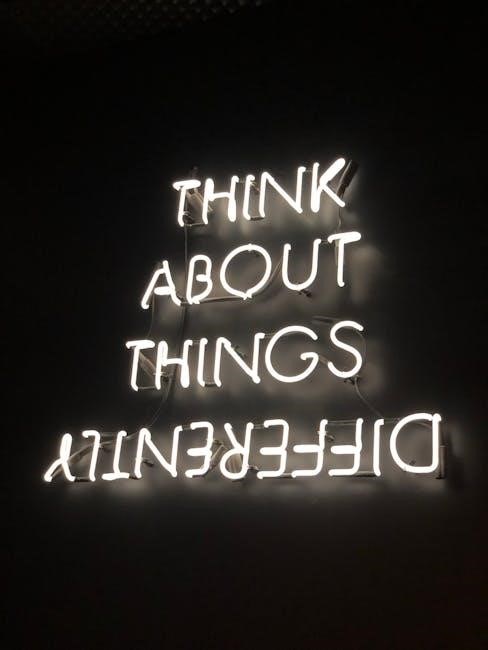A night study guide is a valuable resource to help students optimize their late-night study sessions, ensuring they cover key topics efficiently and retain information effectively for exams.
Why Night Study Sessions Are Sometimes Necessary
Night study sessions are often necessary due to tight schedules, upcoming exams, or the need to focus without daytime distractions. Many students find that late-night study allows them to prioritize material, retain information, and feel more prepared for tests. Additionally, night study can help manage time effectively, especially when balancing multiple responsibilities. It provides an opportunity to organize thoughts, review notes, and tackle complex topics in a quieter environment. For some, the night offers a sense of calm and increased productivity, making it an ideal time to concentrate and achieve academic goals. Proper planning and focus make night study sessions both productive and essential for success.
Preparing for a Night Study Session
Preparing for a night study session involves organizing materials, setting a clear schedule, and creating a conducive environment. Gather all necessary notes, books, and stationery to avoid interruptions. Plan your study schedule, prioritizing key topics and breaking tasks into manageable chunks. Ensure your space is well-lit, quiet, and free from distractions. Stock up on snacks and water to maintain energy levels. Charge your devices and limit digital distractions by turning off notifications. A structured plan and organized setup help maximize productivity and focus during late-night study sessions, ensuring you cover all essential material effectively.
Setting Clear Goals for Night Study
Setting clear goals is crucial for effective night study. Start by identifying the most important topics and tasks, prioritizing them based on urgency and difficulty. Break these goals into smaller, manageable tasks to maintain focus and avoid overwhelm. Create a detailed schedule, allocating specific time slots for each task. This helps ensure steady progress and keeps you on track. Additionally, define measurable outcomes, such as completing a certain number of pages or mastering key concepts. Having clear objectives enhances motivation and direction, making your night study session more productive and goal-oriented.

Effective Study Techniques for Night Study
Active learning, spaced repetition, and the Pomodoro Technique are proven methods to enhance focus and retention during night study, helping you stay efficient and engaged while mastering the material.
Active Learning and Engagement
Active learning involves engaging deeply with study material through techniques like highlighting, summarizing, and self-testing. These methods enhance understanding and retention, especially during late-night sessions; By actively participating in your learning process, you stay focused and avoid passive reading. Engage with your notes by rewriting key points or creating concept maps. Use flashcards to quiz yourself on important terms. Discussing topics with peers or explaining concepts to others also boosts retention. Teaching what you learn to someone else is a powerful way to reinforce your own understanding. Regular breaks and physical activity can refresh your mind, keeping you alert and engaged throughout the night.
Teaching What You Learn to Someone Else
Teaching what you learn to someone else is a powerful study technique that reinforces your understanding and retention. By explaining concepts aloud, you identify gaps in your knowledge and solidify your grasp of the material. This method also promotes active learning, keeping you engaged during late-night study sessions. To apply this technique, try summarizing key points to a friend or family member, or even speaking through ideas aloud to yourself. Using flashcards or creating mock lessons can further enhance this approach. Teaching others forces you to organize your thoughts, making complex topics easier to understand and remember.
Spaced Repetition for Better Retention
Spaced repetition is a highly effective technique for enhancing memory retention during night study sessions. By reviewing information at increasingly longer intervals, you can transfer knowledge from short-term to long-term memory more efficiently. This method reduces the need for cramming and helps maintain focus. Implement spaced repetition by setting specific times to revisit notes or flashcards, allowing your brain to naturally consolidate information. Studies show that this approach significantly improves retention rates compared to massed practice. Incorporating spaced repetition into your study routine ensures that you retain what you learn, even during late-night sessions, and performs better on exams or tasks.

Using the Pomodoro Technique
The Pomodoro Technique is a time-management method that boosts focus during night study sessions. It involves working in focused 25-minute intervals (called “Pomodoros”) separated by 5-minute breaks. After four cycles, take a longer break of 15-30 minutes. This technique helps maintain concentration, reduces burnout, and enhances productivity. By breaking study tasks into manageable chunks, you can stay alert and retain information better. Use a timer to adhere to the intervals strictly. Customize the duration if needed, but the core idea is to balance work and rest effectively. Incorporating this method into your night study routine ensures sustained efficiency and mental refreshment throughout the session.

Staying Focused and Alert During Night Study
Staying focused during night study requires a quiet environment, regular breaks, and hydration. Incorporate stretching or mindfulness to refresh your mind and maintain alertness throughout the session.
Maintaining a Positive Mindset

Maintaining a positive mindset is crucial for effective night study. Start by setting realistic goals and celebrating small achievements to build confidence. Use positive affirmations to stay motivated and remind yourself of your purpose. Break tasks into manageable chunks to avoid feeling overwhelmed. Visualize success and focus on progress rather than perfection. Surround yourself with encouraging materials or quotes to keep your spirits high. Taking short breaks can also help refresh your mind and maintain a positive outlook. Remember, a positive attitude significantly enhances focus and productivity during late-night study sessions.
Managing Distractions Effectively
Minimizing distractions is key to productive night study. Identify common distractions, such as notifications or noisy environments, and address them proactively. Turn off phone alerts or use apps to block social media. Create a quiet, dedicated study space away from high-traffic areas. If studying with others, establish ground rules to maintain focus. Use noise-canceling headphones or play soft background music to mask ambient noise. Regularly assess your environment and adjust as needed to stay on track. By eliminating distractions, you can concentrate better and make the most of your study time, ensuring efficiency and effectiveness throughout the night.
Using Physical Activity to Stay Awake
Physical activity is a powerful tool to combat drowsiness during night study sessions. Engage in short bursts of exercise, such as stretching, jumping jacks, or brisk walks, to boost blood flow and oxygenate your brain. These activities stimulate alertness and prevent fatigue. Light movements, like rolling your shoulders or shaking your limbs, can also help maintain focus. Additionally, incorporating mindfulness exercises, such as deep breathing or yoga poses, can refresh your mind and body. Schedule these breaks every 60-90 minutes to recharge and stay mentally sharp, ensuring you remain productive and alert throughout the night without relying on caffeine or sugary snacks.
Practicing Mindfulness and Relaxation
Practicing mindfulness and relaxation is essential for maintaining focus and reducing stress during night study sessions. Techniques like deep breathing, meditation, and progressive muscle relaxation can help calm your mind and improve concentration. Take short breaks to engage in these practices, allowing your brain to recharge. Even a few minutes of mindfulness can prevent mental fatigue and enhance retention. Incorporate activities such as visualization or grounding exercises to stay present and focused. Avoid overexertion by balancing study with moments of calm, ensuring a sustainable and productive study routine throughout the night.

Optimizing Your Study Environment
Ensure proper lighting, minimize noise, and organize your space to maximize focus. Control temperature for comfort, creating an environment that supports productivity and reduces distractions during night study.
Importance of Proper Lighting
Proper lighting is crucial for maintaining alertness and focus during night study sessions. Bright white light stimulates your brain, helping you stay awake and concentrate. Use high-watt bulbs or a desk lamp to create a well-lit environment. Avoid dim or harsh lighting, as it can cause eye strain or drowsiness. Natural light is ideal, but if unavailable, ensure artificial light is sufficient to keep you alert. Proper lighting not only enhances visibility but also boosts productivity, making it easier to retain information and stay engaged throughout the night.
Minimizing Noise and Interruptions
To maintain focus during night study, it’s essential to minimize noise and interruptions. Turn off notifications on your phone or switch it to silent mode. Inform family and friends about your study hours to avoid disturbances. Consider using noise-canceling headphones or playing soft, non-distracting background music. If studying in a shared space, communicate your needs to others. Avoid multitasking or checking messages, as these can derail your concentration. Creating a quiet, interruption-free environment helps you stay engaged and productive, ensuring you make the most of your study time.
Organizing Your Study Space
An organized study space is crucial for effective night study sessions. Clear clutter and arrange your desk to ensure all necessary materials are within reach, reducing unnecessary movements. Position your chair and lighting to promote good posture and visibility. Keep essential items like pens, notebooks, and water readily available. Use folders or tabs to categorize notes and textbooks, making it easier to locate specific information quickly. A tidy environment minimizes distractions and helps maintain focus, allowing you to concentrate on your study goals without interruption.
Controlling Temperature for Comfort
Maintaining a comfortable temperature is essential for effective night study sessions. A room that is too hot or cold can distract you and reduce productivity. Aim for a moderate temperature between 68-72°F (20-22°C) to stay alert and focused. Use a fan or heater as needed to regulate the environment. Avoid extreme temperatures, as they can lead to drowsiness or discomfort. Consider taking short breaks to adjust the temperature or step outside for fresh air if needed. Dressing in layered clothing can also help you adapt to changing comfort levels throughout the night, ensuring you stay focused on your study goals.

Time Management Strategies
Effective time management is crucial for night study success. Set clear schedules, prioritize tasks, and minimize distractions to maximize productivity and maintain focus throughout the night. Use techniques like the Pomodoro method to balance study and breaks efficiently, ensuring sustained concentration and retention of material.
Time Management Tips for Night Study
Effective time management during night study involves prioritizing tasks, setting specific goals, and avoiding distractions. Create a detailed schedule, allocating time blocks for each subject or topic. Use the Pomodoro Technique, studying for 25 minutes followed by a 5-minute break, to maintain focus. Minimize multitasking and eliminate digital distractions by turning off notifications. Regular breaks help prevent burnout and maintain productivity. Additionally, break down larger tasks into smaller, manageable chunks to avoid overwhelm. Staying organized and adhering to your schedule ensures you cover all necessary material efficiently, making the most of your night study sessions while maintaining mental clarity and focus.
Breaking Down Study Tasks into Chunks
Breaking study tasks into smaller, manageable chunks enhances productivity and reduces overwhelm. Divide large topics into subtopics, focusing on one concept at a time. For example, allocate 30 minutes to reading a chapter, 20 minutes to summarizing notes, and 10 minutes to reviewing key points. This method ensures steady progress without mental fatigue. Prioritize complex tasks earlier when focus is highest and save simpler tasks for later. Use time-blocking to organize tasks visually, helping you stay on track. Regularly review your progress to adjust the plan if needed, ensuring efficient use of time and maintaining momentum throughout the night;
Taking Regular Breaks to Recharge
Taking regular breaks is crucial for maintaining focus and productivity during night study sessions. Implementing short, 10-15 minute breaks every 60-90 minutes allows the brain to rest and recharge, preventing mental fatigue. Use this time to stretch, walk around, or practice light exercises to boost blood circulation and oxygen flow to the brain. Avoid screens during breaks to reduce eye strain and mental stimulation. Instead, engage in relaxing activities like deep breathing or listening to calming music. A well-timed break can refresh your mind, improve concentration, and enhance your ability to absorb information effectively when you return to studying. Consistency in break-taking helps sustain energy levels throughout the night.
Avoiding Burnout During Long Study Sessions
Avoiding burnout is essential to maintaining productivity and mental well-being during extended night study sessions. Prolonged focus without adequate rest can lead to mental exhaustion, decreased concentration, and reduced retention of information. To prevent burnout, set realistic goals and pace yourself throughout the night. Prioritize tasks based on importance and deadlines, and avoid overloading yourself with too much material. Incorporate relaxation techniques, such as deep breathing or short meditation, to calm your mind. Ensure your study environment is comfortable and free from distractions. Taking regular breaks and engaging in light physical activity can also help recharge your energy levels and maintain focus. Balancing study with rest is key to sustaining long-term productivity.

Health and Wellness During Night Study
Maintaining health and wellness is crucial during night study sessions to sustain energy and focus. Prioritize nutrition with light snacks, stay hydrated, and avoid heavy meals or sugary foods. Ensure adequate sleep before or after studying, as short naps can refresh your mind. Manage stress through mindfulness or relaxation techniques to preserve mental well-being. A balanced approach to physical and mental health helps optimize study efficiency and overall performance during late-night study periods.
Nutrition and Snacking Tips
Nutrition plays a vital role in maintaining energy and focus during night study sessions. Opt for light, protein-rich snacks like nuts, fruits, or granola bars to keep your energy levels steady without feeling bloated. Avoid heavy meals and sugary foods, as they can cause drowsiness and decreased alertness. Incorporate snacks that promote brain function, such as berries, dark chocolate, or yogurt, to enhance cognitive performance. Additionally, drink water regularly to stay hydrated, as dehydration can lead to fatigue and decreased concentration. Balanced nutrition ensures you can study efficiently and retain information effectively throughout the night.
Staying Hydrated Throughout the Night
Staying hydrated is essential for maintaining focus and energy during night study sessions. Dehydration can lead to fatigue, headaches, and decreased concentration, hindering your ability to retain information. Aim to drink at least 8 ounces of water every hour to keep your mind sharp. Avoid excessive caffeine and alcohol, as they can dehydrate you further. Consider keeping a water bottle nearby to remind yourself to drink regularly. Incorporating hydrating snacks, such as watermelon or cucumbers, can also help maintain your hydration levels. Proper hydration ensures you remain alert and productive, making your study time more effective and efficient throughout the night.
Managing Sleep Before and After Study
Managing sleep before and after study sessions is crucial for cognitive function and memory retention. Prioritize sleep by setting a consistent sleep schedule, even on weekends. Aim for 7-9 hours of quality sleep each night to enhance learning and focus. If pulling an all-nighter, try to bank sleep beforehand by sleeping a few hours longer in the days leading up to the study session. After studying, ensure a restful environment with dim lighting and minimal noise to improve sleep quality. A short 90-minute nap can also refresh your mind, but avoid napping too close to bedtime to prevent disrupting your sleep cycle. Proper sleep management supports better academic performance and overall well-being.
Monitoring Physical and Mental Health
Monitoring your physical and mental health is essential during night study sessions. Stay hydrated by drinking water regularly, as dehydration can lead to fatigue and reduced focus. Avoid heavy meals and opt for light, protein-rich snacks to maintain energy levels without causing drowsiness. Limit caffeine and avoid alcohol, as they can disrupt concentration and sleep patterns. Take short breaks to stretch or move around, which can help maintain alertness and prevent physical strain. Mentally, practice stress-reducing techniques like deep breathing or mindfulness to stay calm and focused. Prioritize restful sleep afterward to recharge, ensuring better performance and overall well-being.

Technology and Tools for Night Study
Digital tools can significantly enhance night study efficiency. Use apps for note-taking, flashcards, and organization to streamline your workflow. Enable focus-enhancing browser extensions to block distractions. Alarms and timers help maintain schedules, while AI tools like language translators or concept explainers can aid understanding. Minimize screen brightness and use blue light filters to reduce eye strain. Explore study-specific software for interactive learning and progress tracking. Ensure all devices are fully charged and within reach to avoid interruptions. By leveraging technology wisely, you can create a productive and distraction-free study environment tailored to your needs.
Digital Tools to Enhance Study Efficiency
Digital tools can revolutionize your night study sessions by boosting productivity and focus. Utilize note-taking apps like Evernote or OneNote to organize and review material efficiently. Flashcard apps such as Anki or Quizlet help with active recall and spaced repetition, ensuring better retention of information. Focus-enhancing browser extensions like Freedom or StayFocusd can block distracting websites, keeping you on track. Additionally, timers and alarms can help you stick to study schedules and breaks. Consider using mind-mapping software to visually organize complex topics. Many tools also offer AI-powered features to summarize notes or provide explanations. By leveraging these digital resources, you can streamline your study process and maximize your efficiency during late-night sessions.
Minimizing Digital Distractions
Minimizing digital distractions is crucial for maintaining focus during night study sessions. Turn off notifications on your phone or place it in “Do Not Disturb” mode to avoid interruptions. Use website blockers like Freedom or SelfControl to restrict access to social media and non-essential sites. If possible, study on a device without internet connectivity or use apps that enforce focus, such as StayFocusd. Additionally, consider implementing “phone-free” periods to dedicate uninterrupted time to studying. By reducing digital distractions, you can create an environment conducive to deep learning and productivity, ensuring you stay on track with your study goals throughout the night.
Using Alarms and Reminders Effectively
Alarms and reminders are powerful tools to stay on track during night study sessions. Set specific time-based alarms to transition between tasks or breaks, ensuring adherence to your study schedule. Use digital calendars or apps like Google Calendar to remind you of upcoming tasks or deadlines. Additionally, set alarms to prompt regular breaks, helping maintain focus and prevent burnout. Reminders can also be used to signal when it’s time to review notes or switch subjects. By effectively utilizing alarms and reminders, you can create a structured and efficient study routine, keeping yourself organized and focused throughout the night without losing track of time.
Leveraging AI for Study Assistance
AI can significantly enhance your night study sessions by providing tailored support. Tools like language models can summarize complex topics, generate flashcards, and even answer specific questions to clarify concepts. Additionally, AI-powered apps can help organize study materials, track progress, and offer personalized learning strategies. For instance, AI can analyze your study habits and suggest the most effective techniques for retention. Some platforms also provide real-time explanations for difficult problems, acting as a virtual tutor. By integrating AI into your study routine, you can save time, improve focus, and achieve better outcomes, making your night study sessions more productive and efficient. Utilize AI wisely to maximize your learning potential.

Motivation and Mindset
A strong mindset is crucial for night study success. Harness your inner drive, stay resilient, and maintain a positive attitude to overcome challenges and stay focused throughout the night.
Setting Motivational Milestones
Setting clear, achievable milestones helps maintain momentum during night study sessions. Break down your study goals into smaller tasks, celebrating each accomplishment to stay motivated and track progress. This approach fosters a sense of accomplishment and keeps you focused on long-term objectives. By creating a structured plan, you can tackle complex topics systematically, ensuring steady advancement. Milestones also serve as reminders of your capabilities, boosting confidence and maintaining a positive mindset even during challenging moments. Celebrate each milestone with a brief reward, reinforcing your commitment to success and keeping your motivation high throughout the night.
Positive Reinforcement Techniques
Positive reinforcement is a powerful tool to maintain motivation during night study sessions. Reward yourself after achieving specific milestones, such as completing a challenging chapter or solving complex problems. Small incentives like a favorite snack, a short break, or even a moment of relaxation can boost morale. Use affirmations like “I’ve got this” or “I’m making great progress” to stay confident. Surround yourself with uplifting messages or quotes to keep your mindset positive. Celebrate every small victory to reinforce your efforts and stay driven. These techniques help maintain focus and energy, ensuring you remain motivated throughout the night. Consistency is key to long-term success;
Creating Accountability for Study Sessions
Accountability is crucial for staying committed to night study sessions. Share your study goals with a trusted friend or family member and ask them to check your progress. Joining a study group or finding a study partner can also foster accountability, as you collectively track each other’s progress. Use digital tools like planners or apps to set reminders and deadlines, ensuring you stay on track. Regularly review your achievements and adjust your plan as needed. This structured approach helps maintain focus and motivation, ensuring consistent effort and progress throughout the night. Accountability systems keep you responsible and dedicated to your study objectives. Stay committed and watch your goals unfold. Consistency is key to success.
Visualizing Success and End Goals
Visualizing success and end goals is a powerful motivational tool for night study sessions. Imagine yourself achieving your objectives, such as acing an exam or mastering complex concepts. This mental imagery boosts confidence and focus, helping you stay driven during late-night study hours. Set clear, achievable goals and break them into smaller, manageable steps. Celebrate each milestone reached, as this reinforces determination and progress. By aligning your efforts with a clear vision of success, you maintain direction and purpose, even when fatigue sets in. Keep your end goals in mind to stay motivated and reminded of the rewards awaiting your hard work and dedication.
A night study guide offers strategies to enhance productivity and retention, helping you achieve academic success through effective planning and focused learning, even during late hours.
Summarizing Key Night Study Strategies
To maximize productivity during night study sessions, it is essential to implement a structured plan and utilize effective techniques. Start by identifying your most productive study methods, whether in silence or with background noise, and create a detailed schedule. Prioritize critical material, break tasks into manageable chunks, and incorporate active learning strategies like teaching concepts to others. Use tools like spaced repetition and the Pomodoro Technique to enhance retention and maintain focus. Minimize distractions by turning off devices and organizing your study space. Stay hydrated, eat light snacks, and take short breaks to recharge. Physical activity and mindfulness practices can also help maintain alertness and reduce stress, ensuring a balanced and efficient study session.
- Plan and prioritize tasks effectively.
- Use active learning and spaced repetition techniques.
- Stay hydrated and energized with healthy snacks.
- Incorporate breaks and physical activity to stay alert.
- Maintain a positive mindset and minimize distractions.
By combining these strategies, you can optimize your night study sessions for better retention and overall success.
Encouragement for Consistent Implementation
Consistently applying night study strategies can significantly enhance your academic performance and overall confidence. By prioritizing effective techniques and maintaining discipline, you can achieve your goals more efficiently. Remember, staying focused and organized during late-night sessions will help you retain information better and reduce stress. Celebrate small milestones to keep yourself motivated and remind yourself of the importance of perseverance. Surround yourself with supportive peers who encourage your dedication. Lastly, reward yourself for consistent effort, reinforcing the positive habits that lead to success.
Stay committed, and you’ll see the transformative impact of consistent night study implementation on your educational journey.
